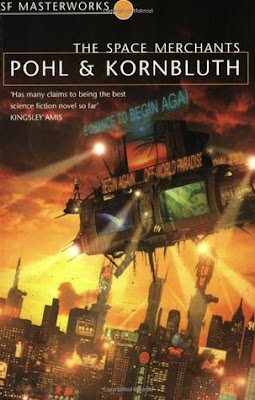© 1952 by Frederik Pohl and C.M. Kornbluth
I grabbed my phone and slammed a connection through to
my special detail in Business Espionage. “Put tails on Jack O’Shea,” I snapped.
“He’s leaving the building soon. Tail him and tail everybody he contacts. Night
and day. If I hit paydirt on this you and your men get upgraded and bonused.
But God help you if you pull a butch.”
- The Space
Merchants, ultimate paragraph, chapter 16
If you were a movie-goer in the early 80s,
particularly if you watched a Monty Python movie (or a movie starring a Monty
Python alum, like, er, Time Bandits),
you may recall seeing a pretty clever ten minute clip. It featured a bunch of
stereotypical office workers whose company suddenly – and quite literally –
decides to go to war. Or rather, fend off an attack. Skyscrapers become
18th-century warships, moving past each other, as grappling hooks are thrown
out windows. Pirates in three-piece suits and casual Friday attire swing into
battle. Cannons are fired, file cabinets explode, and the whole this become a
surreal detour to something like Blackbeard
meets The Office.
Well, this was the image that took up residence in my
mind reading Pohl and Kornbluth’s The
Space Merchants – except with a science fiction space opera twist, of
course. Say, Michael Scott and Dwight Schrute fighting the bugs in Starship Troopers. Or something like
that. My imagination’s vivid.
Anyway, need I expound on how great a writer Frederik
Pohl was / is? Don’t know much about his occasional literary partner Cyril Kornbluth
except that he died tragically young (age 34 it turns out) of a heart attack.
How much of what is who’s contribution, I can’t tell. I’ve never read anything else
by Kornbluth but I have read other Pohl works (Man Plus and Gateway come
immediately to mind). Together they make a great team. Space Merchants is gritty 50s noir meets action potboiler, where
everyone talks like Bugs Bunny and dresses like the Jetsons. It’s that awesome.
There are too many twists, turns, and genuine
surprises over the course of the tale to rehash or even hint at in this little
review. It’s basically a sharp, eerily prescient satire of Big Advertising.
Advertising so powerful and ravishing it controls just about every facet of
human life on 21st century Earth, business so dominant that congressmen come
directly from corporations, life so cheap that one can find oneself trapped in
such a nasty occupation as a scum skimmer on the drop of a dime. It’s all tongue-in-cheek,
witty, fast-paced, but it’s still dystopia. Big business, with advertising as
its mace, its battleaxe, its Minuteman peacekeeper missile, is so ravenous its
set its sights on the next open frontier: the virgin world of Venus.
Mitch Courtenay is a rising star at Fowler Schocken
Associates, a Madison Avenue powerhouse locked in a fight to the death with its
rival, Taunton Associates, for, well, literally everything, from daily fixes
such as coffee, chips, and cigarettes, to where people should live and what
they should do. He’s tasked with the job of stealing Venus – inhospitable,
deadly Venus – from Taunton, and in the process, convincing the average Joe and
Jane to move there. Where, of course, they’d eat Schocken-approved food and
live in Schocken-approved dwellings wearing Schocken-approved clothing, etc.
And the fight is literally to the death as Mitch
dodges a couple of creative assassination attempts and an unnerving date with a
creepy torturer. While trying to come up with a creative angle for Venusian
emigration via a dwarf with a chip on his shoulder. While trying to woo his strangely
distant doctor wife who he’s madly in love with. He’s shanghaied, and has to
fight back by infiltrating an underground ecological revolutionary movement.
There’s office politics, presidential politics, a very hostile takeover attempt,
all sprinkled deftly with lots of crass and clever humor. The plot moves, the
pages turn, spiraling to an ending I didn’t anticipate.
It even had the tinge of sadness from unrequited love.
I liked it a lot.
Grade: solid A
[Now, the book’s entire premise satirizes and parodies
the whole Big Advertising phenomenon, nascent in Pohl’s time and full-blown in
ours (though not as hyper-realized as it is in The Space Merchants). But this is okay, because the authors don’t
wage sloppy, heavyhanded war against it like, oh, a devout Bernie Sanders
disciple might. We all know and understand that completely unfettered capitalism,
like just about anything completely unfettered, is not a good thing. I like my capitalism
just fine. It enabled me to earn the money to buy this book freely. After
reading The Space Merchants, I feel
certain Pohl and Kornbluth agree.]






No comments:
Post a Comment